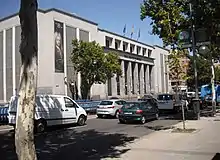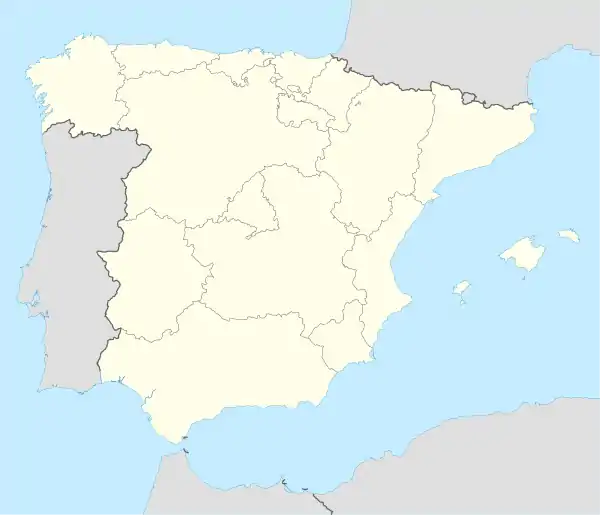Museo Casa de la Moneda (Madrid)
The Museum of the Royal Mint (Museo Casa de la Moneda) is a permanent exhibition for the Spanish Royal Mint in Madrid, Spain, begun in 1867.[1]
Museo Casa de la Moneda | |
 | |
 Location in Spain | |
| Established | 1867 |
|---|---|
| Location | Calle del Doctor Esquerdo Nº 36 Community of Madrid |
| Coordinates | 40.422861°N 3.669044°W |
| Collection size | Coins, banknotes, medals, lottery tickets, postage stamps |
| Website | Official website |
History
The museum dates from the eighteenth century and its origins are closely linked with Tomás Francisco Prieto, General Engraver of the Mint of King Carlos III. He was Director of Engraving at the Royal Academy of Fine Arts of San Fernando and in 1771 founded a School of Engraving. At this school were the craftsmen who would later to work at the Royal Mint of Spain and its colonies.[1]
The museum's origins can be traced to a collection of drawings, engravings, old books, coins and medals made by Prieto to aid in the teaching of his pupils, which was purchased by King Carlos III. After his death, in 1783, it was successively added to by acquisitions and donations. The original collection was first exhibited to the public in 1867, during the reign of Queen Isabel II, in the former Casa de la Moneda building on Madrid's Plaza de Colón. It remained there until 1964, when it moved to its present location at Calle Doctor Esquerdo Nº 36.[1]
La Fábrica Nacional de Moneda y Timbre (FNMT, the National Coin and Stamp Factory) was founded in 1893, with the merger of two separate organizations: the Mint and the Stamp Factory. Since 1861 both institutions shared the same building, at Plaza de Colón, although they were independent and were run separately.[2]
Exhibits

The museum is considered one of the most important museums, of its kind in the world.
The numismatic collection includes a history of the coin from its origins, passing through the coinage of Greek and Roman with examples of coins minted in Syracuse, Athens and Aegina. There are some first issues of the Roman Republic. It has a notable collection of Hispanic currency, with items coming mostly from the collection of Gómez Moreno.[1]
References
- "Historia del Museo - FNMT". www.museocasadelamoneda.es. Retrieved 31 January 2019.
- "Fábrica Nacional de Moneda y Timbre. Real Casa de la Moneda - FNMT". www.fnmt.es. Retrieved 31 January 2017.